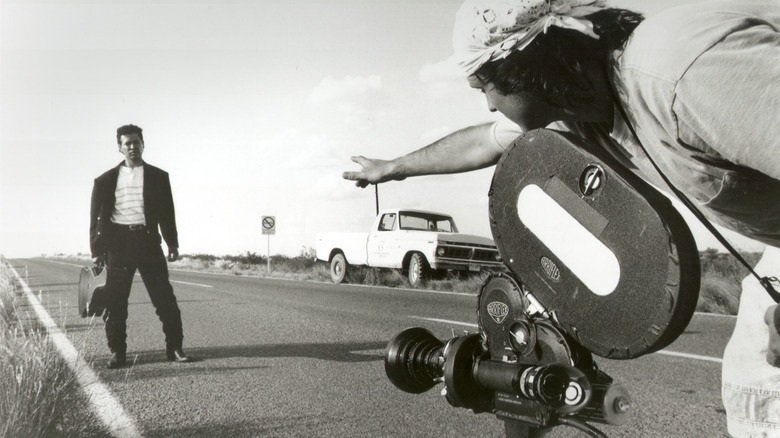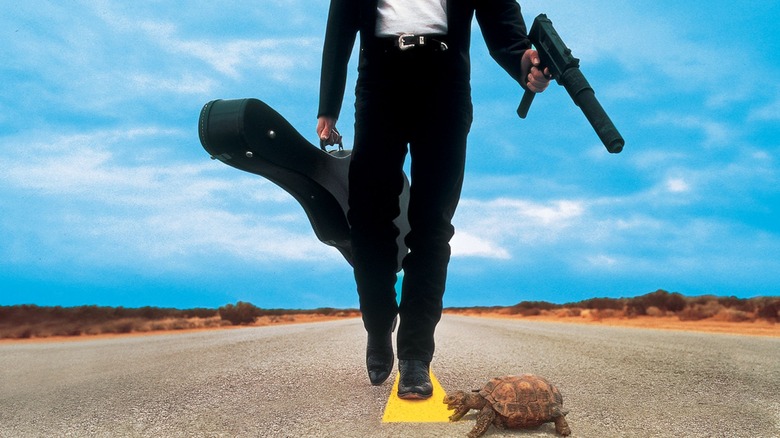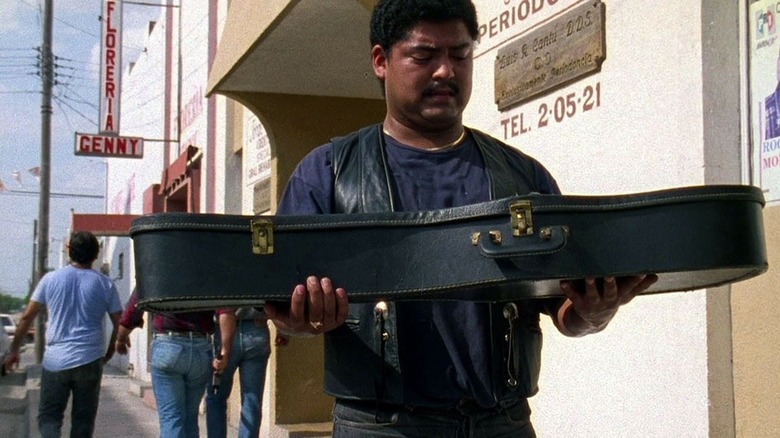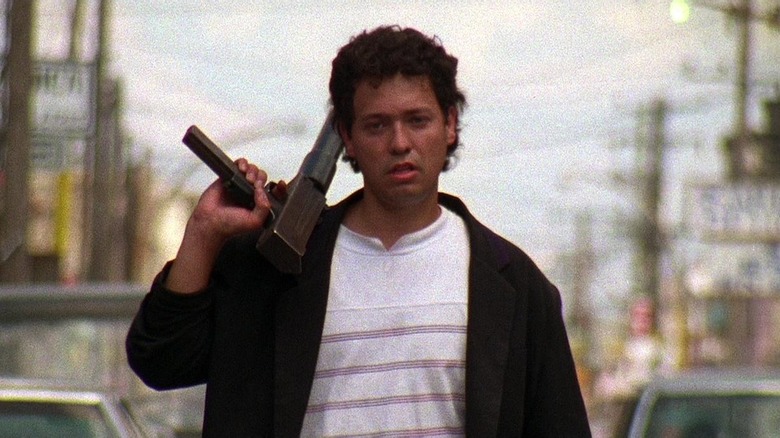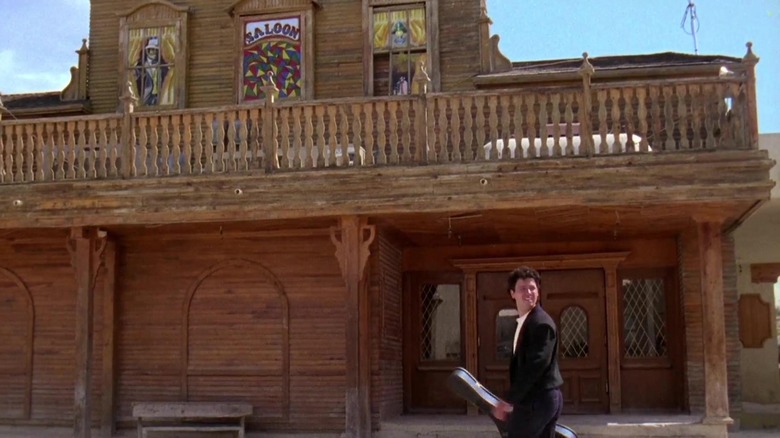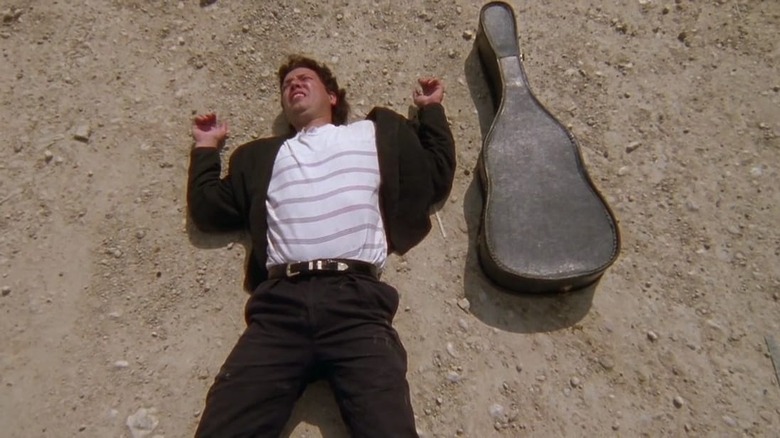Tales From The Box Office: Robert Rodriguez's El Mariachi Took Low-Budget Filmmaking To New Heights
(Welcome to Tales from the Box Office, our column that examines box office miracles, disasters, and everything in between, as well as what we can learn from them.)
There are low-budget movies like last year's "Barbarian," which became a sizable hit against a $4.5 million budget, and the kind of success story that often makes headlines. There are micro-budget movies, such as Sean Baker's "Tangerine," which was shot on iPhones and produced for a mere $100,000. And then there's "El Mariachi," the feature directorial debut of Robert Rodriguez, which was made for a hair over $7,000 and ultimately scored him a two-picture deal at Columbia Pictures. To date, his films have earned more than $1.5 billion at the global box office, and he even ran the El Rey TV network for nearly a decade.
The success Rodriguez managed to string together from pretty close to nothing is the stuff of legend in Hollywood, and it has inspired many young filmmakers to gather whatever resources they can get their hands on and make their movie, rather than wait for the moneymen to say "yes" or "no." This is one of those success stories that, for three decades, has been a guiding light for those hoping to one day break into the movie business — or really any artistic endeavor with gatekeepers at the helm. But as with all legends, it's far more complicated and nuanced than a snappy anecdote allows.
In honor of the film's 30th anniversary, we're looking back at "El Mariachi," how it came to be, how Rodriguez managed to pull off such a thing with so little money, how much money it actually cost to bring the movie to theaters, and what lessons we can learn from it all these years later. Let's dig in, shall we?
The movie: El Mariachi
Rodriguez grew up in Texas as part of a big family and from a young age wanted to make movies. He eventually enrolled at the University of Texas but couldn't get into the film program because of his grades. But when his short film "Austin Stories" won first prize at the Third Coast Film and Video Competition, he had some words for the head of the department. "I beat your students. Can I get in the department now?" he asked, according to a Filmmaker Magazine profile of the then-young filmmaker. And so, he got in. But for Rodriguez, it was more about access to equipment than it was about education.
"I didn't have the money to rent equipment. I wanted to be in the film department for the free equipment. I didn't go there to learn how to tell a story."
After having success with a very thrifty short called "Bedhead," Rodriguez decided that he wanted to make a feature. "Since [Bedhead] was eight minutes long and cost $800, I figured I could make an 80-minute feature for $8,000." In the end, he would pull it off for $7,225. The movie he cooked up with his friend and eventual star of the film, Carlos Gallardo, was "El Mariachi."
The film centers on a traveling guitar player who simply wants to play music for a living. At a stop in a bar in a small town, local hitmen mistake him for a professional killer. Gunplay ensues, but Rodrigues and Gallardo had next to no resources between them. To raise the money, Rodriguez subjected himself to pharmaceutical research. Ultimately, the two raised $9,000 for the feature. For context, the filmmaker's follow-up, a sequel titled "Desperado," cost nearly 800 times that much with a budget of $7 million.
No crew, no problem
Rodriguez and Gallardo made use of what little resources they had, shooting the movie with a hand-held 16mm camera in just 14 days. For the sake of cost and efficiency, Rodriguez did mostly in single takes, and did so right in front of Gallardo's house, again saving on location scouting. As for the other actors in the film? They utilized people who lived on location in Ciudad Acuna, Mexico — and Rodriguez even convinced them to work for free. In an interview with The Washington Post in 1993, he explained:
"I wouldn't even give them the script to rehearse, because I couldn't pay them, so I certainly couldn't work them. Since I didn't have a film crew, I would tell them about their character, give them a couple of lines — as many as they could remember in a few seconds — they'd say it back, I'd shoot one take. As soon as we finished their lines, I'd send them home before lunch so I wouldn't have to feed them."
One could never get away with such tactics on a studio film, but this was no studio film. Rodriguez was, quite literally, a one-man crew. In his mind, this wasn't about making a hugely marketable movie. Rather, it was about making one he could learn from, and maybe make just enough money to get his next film made.
"This was going to be my film school. I was going to learn how to tell stories by telling stories. I was going to learn how to operate the camera, do the sound and the lighting and everything, hands-on myself ... a crash course. I decided what I need is experience making feature films in a way that if they're no good, no one will see 'em."
An unexpected bit of good fortune
The plan was to sell "El Mariachi" to buyers in the Spanish home video market. Not exactly a lofty goal, but still ambitious enough for a movie made on the extreme end of cheap. Once filming was completed, Rodriguez sent a trailer, along with a copy of "Bedhead," to the Hollywood agency International Creative Management (ICM). Beyond his wildest expectations, ICM was impressed with his work and took him on as a client. As a result, VHS copies of his film were making the rounds at the major studios. In the end, Columbia Pictures signed on to distribute the film and, what's more, signed the budding filmmaker to a two-picture deal.
This is where the myth of the $7,000 movie begins to unravel a touch. In his book "Rebel Without a Crew," Rodriguez detailed making his low-budget debut. At one point, he discussed doing an interview with The Hollywood Reporter, with journalist Donna Parker mentioning that filmmakers at Sundance took issue with the price tag, saying you could never make a 35mm movie for that price. Rodriguez then cleared the air.
"I told her the whole story, cleared up the fact that it was shot on 16mm, not on 35mm, and that my finished tape that got me representation at ICM, one of the biggest talent agencies in the world, and a writing/directing deal at Columbia Pictures, was made for $7,000. You transfer your negative straight to videotape, and you can take the tape to distributors instead of making a 16mm film print."
Indeed, Columbia purchased a $7,000 movie, but they had to blow it up to 35mm for a cost of around $100,000. The studio is also said to have spent $1 million marketing the film. So sure, the original budget was mere thousands, but in the end, it became a $1.1 million (and change) endeavor.
The financial journey
Following very successful screenings at both the Toronto International Film Festival and Sundance, "El Mariachi" was released by Columbia Pictures on February 25, 1994. Though it was released in just 66 theaters, the theatrical release was still far more than Rodriguez and Gallardo ever imagined when they were picturing a Spanish home video release. It earned $312,528 for a pretty impressive $4,735 per-screen average — more than half the budget of the original shoot. While the theatrical run only lasted several weeks, the buzzy, scrappy picture collected $2.04 million, meaning Columbia absolutely made some money in the end even with the additional investment.
More to the point, the home video market around the world was far more robust at the time, and any money seen from VHS (and eventual DVD) was all icing on the cake. Beyond that, Columbia had the rights to the follow-up and, when "Desperado" opened two years later with Antonio Banderas taking over the lead role, it earned a healthy $25 million at the box office against a $7 million budget. Years later, the trilogy would reach its end with "Once Upon a Time in Mexico," which made $97.4 million against a $29 million budget. The studio made an investment in a promising, thrifty filmmaker, and it paid off handsomely.
But Columbia also bought themselves one heck of a story, given how the film that started it all came to be. The Guinness Book of World Records even recognizes "El Mariachi" as the lowest-budget movie to make $1 million at the US box office. Not bad for a guy who just wanted to get into film school so he could have access to equipment.
The lessons contained within
Similar to what Kevn Smith managed to do with "Clerks" in 1994, there are few stories more inspiring to young filmmakers than that of Robert Rodriguez and his debut feature. We're talking about a man who did this 30 years ago when the equipment was expensive, hard to come by, and the internet wasn't even really a thing yet, so forget self-distribution. Even though there is a bit of gray area when it comes to the myth of it all with that $7,000 price tag, it is true that the man made a movie for less than $16,000 (adjusting for inflation), and that's impressive. Anyone wanting to do the same today could do so with a digital camera and not have to worry about paying for — or developing — film.
In that way, it's the ultimate artist's lesson, rather than a business one. Sure, one can look to Columbia Pictures and say "good on you" for making a very wise bet on a tiny movie from an unknown filmmaker. And yes, one could argue things like that should happen more often, as a studio of that size has little to lose on a bet that small. But really, it all goes back to something else Rodriguez said in that Filmmaker Magazine profile from three decades ago:
"Part of the problem with student films with 100 people in the credits is that you can't tell what exactly is the director's talent. On 'El Mariachi,' I took the credit — or blame — for the writing, direction, camerawork, and editing. The nice thing about making a movie by yourself is that you can take credit for any aspect of it anyone likes."
To punctuate the point, the man who would go on to make blockbusters such as "Spy Kids" and "Alita: Battle Angel" added, "A lot of people are sitting around waiting for someone to hand them money. It's never going to happen."
